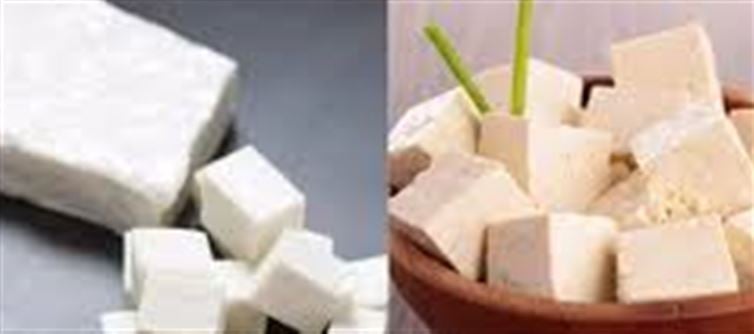
When it comes to building muscle, protein is essential. Among vegetarians and fitness enthusiasts, paneer (Indian cottage cheese) and tofu (soybean curd) are two of the most debated protein sources. Both are packed with nutrients, but which one wins when it comes to supporting muscle gain? Let’s break it down.
1. protein Content: The Building Block of Muscle
Paneer:
Paneer is rich in protein, providing approximately 18 grams of protein per 100 grams. This makes it an excellent source of protein for muscle repair and growth. Since it’s made from milk, paneer is also high in casein, a slow-digesting protein that helps provide a sustained release of amino acids for muscle recovery.
Tofu:
Tofu, made from soybeans, offers 8-15 grams of protein per 100 grams, depending on the firmness. While it's a great plant-based protein source, it has a lower protein content compared to paneer, especially in its softer forms. However, tofu is a complete protein, containing all nine essential amino acids necessary for muscle repair and growth.
2. Fat Content: Balance is Key
Paneer:
Paneer is higher in fat compared to tofu, with about 20 grams of fat per 100 grams in its full-fat version. While it’s a great source of healthy fats, excessive fat intake could hinder fat loss if you’re in a calorie deficit. Opting for low-fat paneer can reduce this concern.
Tofu:
Tofu is generally lower in fat, with around 4-6 grams of fat per 100 grams. Its fat content is mostly polyunsaturated fats, which are heart-healthy. If you're aiming for a low-fat diet while building muscle, tofu might be a better option.
3. calcium Boost: Supporting Bone Health
Paneer:
Being a dairy product, paneer is an excellent source of calcium, which is crucial for bone strength. Strong bones are essential for overall muscle performance and reducing the risk of injury during intense training.
Tofu:
Tofu also provides calcium, but the content can vary depending on how it’s made. Many tofu varieties are fortified with calcium, making it a solid option for vegetarians who need this vital mineral for bone health.
4. Digestibility: Easier on the Stomach
Paneer:
While paneer is nutritious, it can be difficult for some individuals to digest, especially if they are lactose intolerant. However, paneer made from skim milk (low-fat) or non-dairy alternatives (like almond milk) can reduce these digestive concerns.
Tofu:
Tofu is highly digestible, especially for people who are lactose intolerant or prefer plant-based options. It’s gentle on the stomach and can be easily incorporated into various meals for a lighter alternative to dairy-based proteins.
5. Micronutrients: More Than Just Protein
Paneer:
In addition to protein and calcium, paneer is a good source of vitamin B12, which is typically found in animal products and is vital for muscle recovery and energy production. It also contains a range of other micronutrients like vitamin D, phosphorus, and magnesium.
Tofu:
Tofu is rich in iron, which helps in the formation of red blood cells and oxygen transport to muscles during exercise. It also contains magnesium, which helps with muscle relaxation and recovery post-workout.
6. Conclusion: Which One Should You Choose?
Both paneer and tofu are excellent choices for muscle gain, but the decision comes down to your specific needs and dietary preferences:
· Choose Paneer if: You’re looking for a higher protein and fat content, and you're not lactose intolerant.
· Choose Tofu if: You prefer a plant-based option, are lactose intolerant, or are looking for a lower-fat alternative.
Ultimately, incorporating a mix of both can offer the best of both worlds. Whether you're a dairy lover or following a vegan lifestyle, both paneer and tofu can play an important role in supporting your muscle-building journey.
Disclaimer:
The views and opinions expressed in this article are those of the author and do not necessarily reflect the official policy or position of any agency, organization, employer, or company. All information provided is for general informational purposes only. While every effort has been made to ensure accuracy, we make no representations or warranties of any kind, express or implied, about the completeness, reliability, or suitability of the information contained herein. Readers are advised to verify facts and seek professional advice where necessary. Any reliance placed on such information is strictly at the reader’s own risk..jpg)




 click and follow Indiaherald WhatsApp channel
click and follow Indiaherald WhatsApp channel